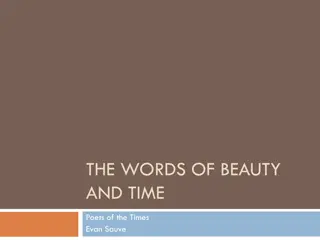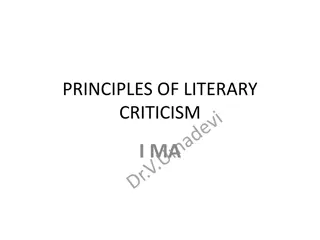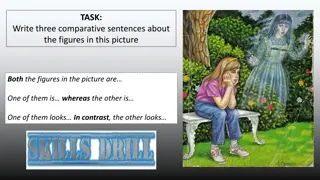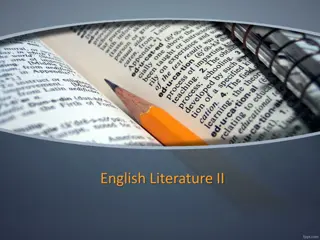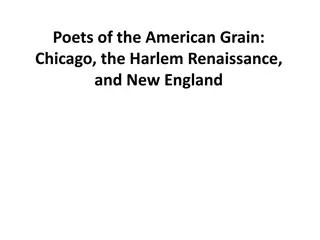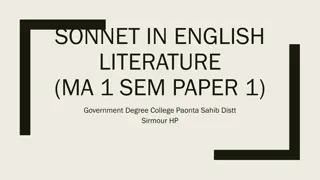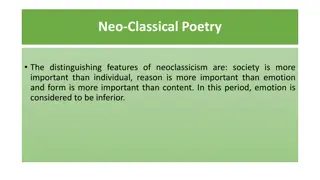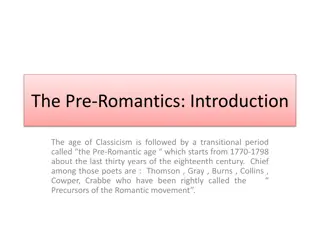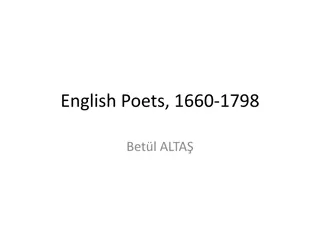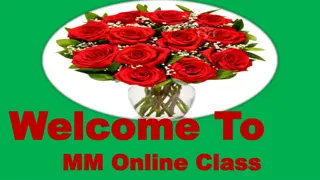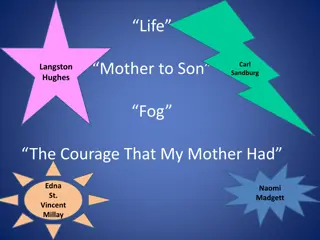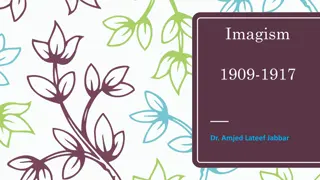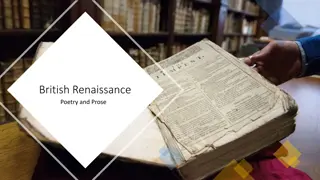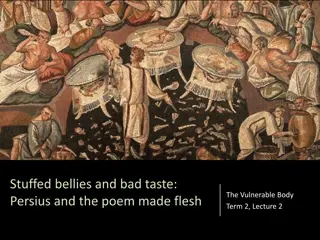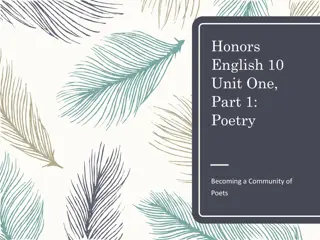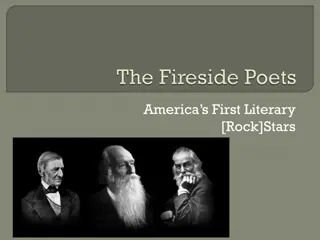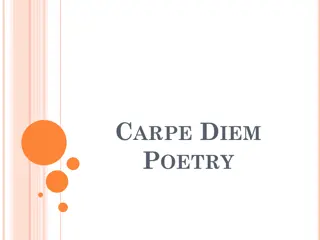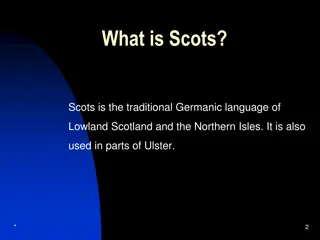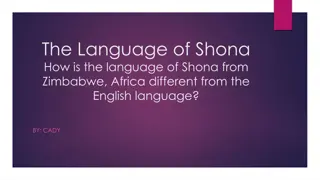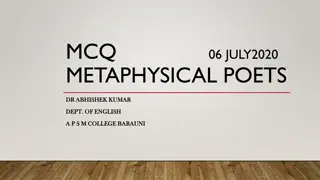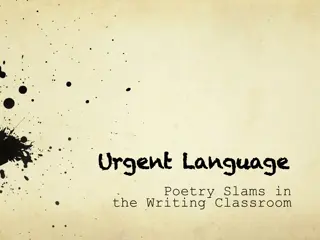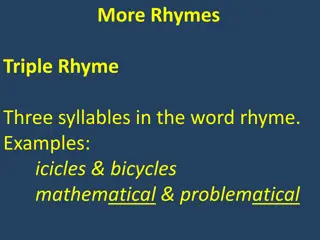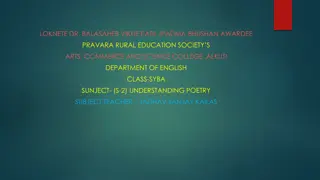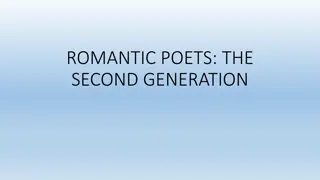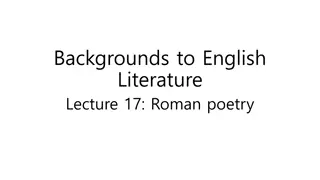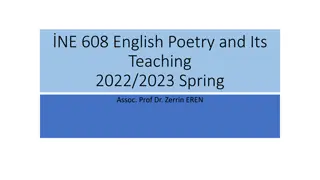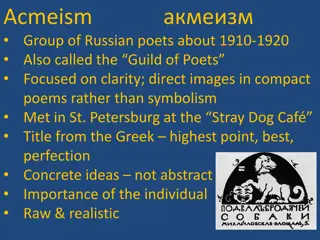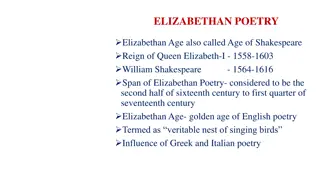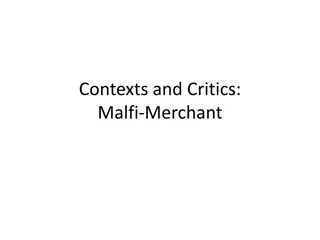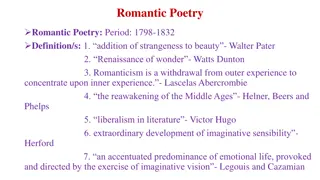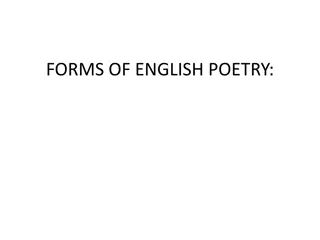Poets Through Time: A Glimpse into Literary Legends
Explore the lives and works of renowned poets such as William Shakespeare, William Blake, Robbie Burns, Edgar Allan Poe, Emily Dickinson, Robert Frost, and T. S. Eliot. From Shakespeare's timeless plays to Blake's mystical artistry and Poe's haunting tales, delve into the diverse realms of poetry an
0 views • 11 slides
Evolution of English Literature: From Old English to Beowulf
The English language, evolving over 1,400 years, transitioned from Old English to Middle English with works like Beowulf standing as a pinnacle of Old English literature. The epic poem tells the tale of Beowulf's heroic feats in pagan Scandinavia, showcasing elements of alliteration, a key literary
0 views • 46 slides
Overview of Poetry Genres and Elements for English Students
Explore different genres of poetry including narrative, epic, dramatic, satirical, elegy, fable, and prose poetry. Delve into the unique elements of poetry such as diction and figurative devices like simile and metaphor. Engage with various examples from renowned poets and learn about the aesthetic
1 views • 25 slides
Exploring Metaphysical Poetry: Origins, Elements & Poets
Discover the essence of Metaphysical poetry, rooted in 17th-century England and characterized by ingenious wit, philosophical depth, and intricate literary devices. Learn about prominent poets like John Donne and George Herbert, explore themes of love and spirituality, and unravel the challenging ye
0 views • 36 slides
Comparative Analysis of Poetic Descriptions of Ghostly Visits
Both "His Visitor" and "Ghosts in the Garden" explore the theme of people encountering ghosts, but through different poetic lenses. The poets employ various techniques such as alliteration and sensory imagery to convey the haunting experiences in distinct ways. This comparative analysis delves into
1 views • 8 slides
The Romantic Period in English Literature: Embracing Emotion and Individualism
The Romantic period (1798-1837) in English literature was marked by a shift towards valuing emotion, individualism, and nature over rationalism and industrialization. Influenced by societal changes, the movement included prominent poets like William Wordsworth, Samuel Taylor Coleridge, and Robert Bu
0 views • 33 slides
American Poets of Chicago, Harlem Renaissance & New England
Explore the works of renowned American poets like Robert Frost, Carl Sandburg, Langston Hughes, and Gwendolyn Brooks. Delve into poems such as "The Gift Outright," "Fire and Ice," "The Negro Speaks of Rivers," and "A Bronzeville Mother Loiters in Mississippi." Discover the rich literary landscape of
0 views • 8 slides
The Art of Sonnets in English Literature
A sonnet is a 14-line lyric poem written in iambic pentameter with a specific rhyme scheme and thought structure. There are three main types of sonnets - Italian/Petrarchan, Spenserian, and English/Shakespearian. Each type has a unique rhyme scheme and style. Notable poets like Shakespeare, Spencer,
0 views • 13 slides
Importance of Teaching English at Different Education Levels
English language holds a significant position in the educational system and national life of India. This presentation by Dr. A. Mary Delphine highlights the aims and objectives of teaching English, emphasizing its importance in India and the modern world. The objectives include understanding the rat
1 views • 32 slides
Neo-Classical Poetry: Features and Characteristics
Neoclassical poetry emphasizes society over the individual, prioritizes reason over emotion, and values form over content. Poets must focus on universal themes, reflect nature objectively, and uphold didacticism by teaching moral and intellectual lessons. The era's poets are considered craftsmen who
1 views • 5 slides
Exploration of 17th Century Literature: Themes, Poets, and Poetry Schools
The literature of the 17th century in London is characterized by melancholic themes, centered around notable figures like John Milton. The era saw the rise of two distinct schools of poetry - metaphysical and cavalier poetry. Metaphysical poets like John Donne employed unconventional metaphors and e
0 views • 5 slides
Exploring the Pre-Romantic Poets and Themes
The Pre-Romantic period, a transition from Neoclassicism to Romanticism, is characterized by poets like Thomson, Gray, Burns, and Collins. These poets ushered in a shift towards emotional expression, nature themes, and a rejection of urban life. Pre-Romantic poetry focused on nature, sensibility, me
1 views • 13 slides
English Poets of the 17th and 18th Centuries
Explore the works of prominent English poets from 1660 to 1798, including John Dryden and Alexander Pope. Discover their use of rhymed couplets, satirical writings, translations, and contributions to the Age of Reason in the eighteenth century. Delve into the poetic reflections on nature, life, deat
0 views • 10 slides
Learn English with Mohammad Shahidullah - Online Class Materials
Join the online English classes led by Colonel (Rtd.) Mohammad Shahidullah, Head of the English Department at Bir Bikrom University College. Access study materials, rearrange exercises, and more to enhance your English skills. Explore topics like re-arranging sentences and learn about renowned poets
0 views • 8 slides
Explore Poetry with Poets Langston Hughes, Edna St. Vincent Millay, Naomi Madgett, and Carl Sandburg
Delve into the world of poetry with renowned poets Langston Hughes, Edna St. Vincent Millay, Naomi Madgett, and Carl Sandburg. Discover the themes, structures, and figurative language in their works to enhance your appreciation for poetry.
1 views • 47 slides
Imagism: A Brief Overview of a Modernist Poetry Movement
Imagism was a poetic movement that flourished in Britain and the United States between 1909 and 1917, aiming to break away from the sentimentality of Victorian poetry. Influenced by French symbolists and Japanese haiku, imagist poets like Ezra Pound and Amy Lowell focused on creating concise, vivid
3 views • 21 slides
A River by A.K. Ramanujan - Poetic Reflection on Realism and Tragedy
Attipate Krishnaswami Ramanujan's poem "A River" portrays a stark reality of a river in Madurai that dries up, contrasting with poets who only sing of floods. The poem criticizes traditional poetic portrayals while ironically becoming a violation of realism itself. Ramanujan's poignant verses delve
0 views • 17 slides
British Renaissance Poetry and Prose: Influential Poets and Their Works
Explore the world of British Renaissance poetry and prose through the works of renowned poets like Sir Thomas Wyatt, Edmund Spenser, and Sir Philip Sidney. Dive into the evolution of the sonnet form, from Wyatt's introduction of the Italian/Petrarchan sonnet to Spenser's masterpieces like "The Faeri
1 views • 13 slides
Exploring Roman Verse Satire Through Bodies: Horace and Persius
Delve into the representation and treatment of bodies in Roman verse satire through the works of Horace and Persius. Analyze how these poets intertwine physical vulnerabilities, personal histories, and societal critique within their satirical compositions. Discover the power of vulnerability in sati
0 views • 14 slides
Explore the World of Poetry through Music and Empathy
Delve into the realm of poetry through the harmonious blend of music and empathy in the Honors English 10 Unit One, Part 1: Poetry Becoming a Community of Poets. Uncover the profound connection between lyrics and poetic expressions while discovering the power of empathy and support in the poetic jou
1 views • 131 slides
America's First Literary Rock Stars: The Schoolroom Poets
The Schoolroom Poets, including Henry Wadsworth Longfellow, William Cullen Bryant, James Russell Lowell, Oliver Wendell Holmes, and John Greenleaf Whittier, were America's first literary rock stars. They rivaled British poets in popularity, with their works focusing on American legends and scenes. K
0 views • 13 slides
Exploring Themes of Resistance and Identity in Poetic Works
Delve into the themes of resistance and identity in poetic works by analyzing two different poems with a focus on how poets express their emotions and reactions to societal pressures. Compare the approaches of poets to resisting abuse and stereotypes, highlighting the impact on their personas' emoti
0 views • 6 slides
Exploring Renaissance Poets and Poetry
Delve into the lives and works of prominent Renaissance poets like Christopher Marlowe, Sir Walter Raleigh, Robert Herrick, and Andrew Marvell. Learn about pastoral poetry, sonnets, Petrarchan/Italian sonnets, and the Latin phrase "Carpe Diem" meaning seize the day. Uncover the rich history and capt
1 views • 15 slides
The History and Significance of Scots Language
Scots language, originating from Northumbrian Old English, has a rich history in Lowland Scotland and the Northern Isles. Initially overshadowed by Gaelic, it later developed into its own identity enriched by loanwords. Despite facing a decline in prestige post-Reformation, it experienced a revival
0 views • 26 slides
Contrasting Shona and English Languages in Zimbabwe
The language of Shona in Zimbabwe, Africa, differs from English in various aspects such as script symbols, alphabet, official usage, borrowing of words, and number of speakers. Shona has a script with 35 symbols, while English has a 26-letter alphabet. English is the official language of the USA, wh
0 views • 5 slides
Metaphysical Poets: MCQ Quiz and Answers
Explore a multiple-choice quiz about Metaphysical Poets featuring questions on poets like John Donne and Andrew Marvell, coined terms, literary references, and more. Test your knowledge and check the answers to enhance your understanding.
0 views • 6 slides
Exploring Poetry Slams: A Journey into Oral Tradition
Delve into the world of poetry slams, a vibrant space where spoken-word poets express emotions, share insights, and celebrate the oral tradition of poetic performance. Discover different poetic styles like the Personal Poem, Visionary Poem, Formalist Poem, and Spoken-Word Poem, each offering a uniqu
0 views • 27 slides
Influence of Indian English in "The Jewel in the Crown" by Rochana Jayasinghe
Indian English plays a significant role in the Indian subcontinent with 200 to 333 million English speakers. India is a key player in the English language landscape, publishing more books in English than any other language. The British Raj from 1858 to 1947 shaped the prominence of English in India,
0 views • 18 slides
Exploring Various Rhyme Schemes in Poetry
Dive into the world of poetry with an exploration of different rhyme schemes. From triple rhymes to embracing rhyme, discover how poets use these structures to create captivating verses. Explore examples from Shakespearean sonnets to modern works like "Catch a Little Rhyme" by Eve Merriam and "Neith
0 views • 7 slides
Romantic Poetry and Poets of the Romantic Era
Romantic poetry is characterized by emotional spontaneity, self-expression, and a deep connection to nature. Key poets of the Romantic era include William Wordsworth, S.T. Coleridge, P.B. Shelley, and John Keats. Their works reflect themes of imagination, childhood, and individual feeling, shaping t
0 views • 8 slides
The Second Generation of Romantic Poets: A Revolution in Poetry and Ideals
The second generation of Romantic poets, including Keats, Byron, and Shelley, rebelled against societal norms, championing freedom, individuality, and social change. Their poetry reflects a struggle with language's limitations in expressing profound emotions and ideas. Percy Bysshe Shelley emerges a
0 views • 10 slides
Overview of Roman Poetry and The Eclogues: A Study in Roman Literature
Roman poetry encompassed various genres such as epic, drama, lyric, satire, and pastoral, with poets like Virgil and Catullus making significant contributions. The neoteric poets, inspired by Hellenistic traditions, added a new dimension to Roman poetry. The Eclogues by Virgil, drawing from Theocrit
0 views • 17 slides
Exploring English Poetry: Teaching and Analysis
Dive into the world of English poetry with Assoc. Prof. Dr. Zerrin Eren in NE 608 course. Analyze various poems, discuss the role of poetry in ELT, and explore works by renowned poets like Robert Frost, Sylvia Plath, and more. The course emphasizes teaching strategies, assessment methods, and recomm
0 views • 4 slides
Acmeism: Russian Poetry Movement of 1910-1920
The Acmeism movement, also known as the Guild of Poets, was a group of Russian poets active from 1910 to 1920. They emphasized clarity and direct imagery in concise poems rather than symbolism. Meeting at the Stray Dog Café in St. Petersburg, the poets focused on concrete ideas over abstract concep
0 views • 7 slides
Insights into Elizabethan Poetry: A Glance at the Golden Age
The Elizabethan Age, also known as the Age of Shakespeare, during Queen Elizabeth I's reign from 1558 to 1603, marked a golden era in English poetry. This period saw a flourishing of poetic forms influenced by Greek and Italian poetry. Major poets like Edmund Spenser, Sir Philip Sidney, and William
0 views • 6 slides
GCSE English Language and Literature Overview
GCSE English Language and Literature subjects are led by Mrs. A. Baker and Mr. Doodson. English Language is examined by OCR, while English Literature is examined by Edexcel. Both subjects have two examination papers worth 100% of the grade. English Language papers focus on reading and writing skills
0 views • 14 slides
Influential Writers: Chaucer and Webster in English Literature
Chaucer, born in mid-14th century London, was influenced by French and Italian poets, creating impactful works like "The Canterbury Tales." On the other hand, Webster, born in 1580, crafted dark revenge tragedies like "The Duchess of Malfi," reflecting the troubled mood of his time. Both writers lef
0 views • 7 slides
Choosing the Right English Course for Your HSC: Advanced, Standard, or Studies?
When preparing for the HSC, selecting the appropriate English course is crucial as it is compulsory. Options include Advanced English, Standard English, and English Studies, each offering unique benefits. Advanced English challenges students with higher-order thinking skills, while Standard English
0 views • 25 slides
Exploring the Romantic Era: Poetry, History, and Major Poets
A detailed exploration of Romantic Poetry from 1798-1832, encompassing the defining characteristics, historical background, major poets including Wordsworth and Keats, and the influence of key events like the French Revolution. Romanticism is characterized by subjectivity, imagination, love for the
0 views • 4 slides
Understanding Forms of English Poetry: Blank Verse and Free Verse
Discover the nuances of Blank Verse and Free Verse in English poetry. Blank verse, characterized by unrhymed iambic pentameter, offers a structured yet flexible form for poetic expression. On the other hand, Free Verse grants poets the freedom to experiment with words unrestricted by traditional rhy
0 views • 14 slides
